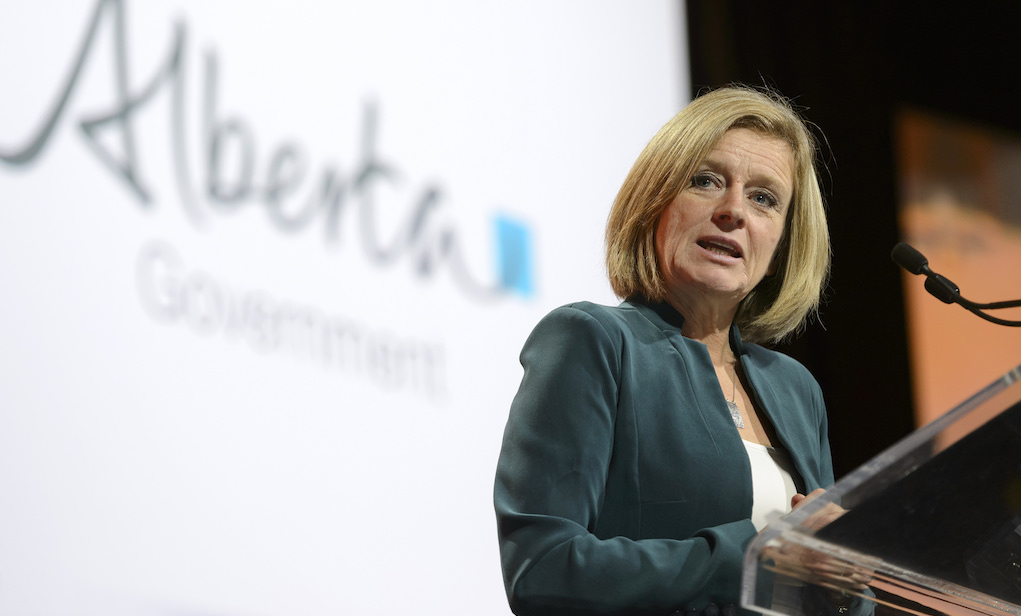No sooner was a truce declared in the Alberta-British Columbia war of wine and oil yesterday afternoon than claims of victory were proclaimed.
“In a small way today, B.C. blinked,” Alberta Premier Rachel Notley told reporters yesterday afternoon.
Thanks to that B.C. blink, Premier Notley explained, the Alberta Gaming and Liquor Commission will start buying B.C. wine again.
The supposed blink, in Alberta’s reading of the affair, was B.C. Premier John Horgan’s statement yesterday that his province won’t try to put any restrictions on pipeline shipments of diluted bitumen from Alberta to the West Coast until B.C.’s constitutional reference case has determined if the province has any jurisdiction to regulate what gets piped through its territory.
Not sure how this is a blink, since he said basically the same thing at a news conference two weeks ago, but politics is 90 per cent perception, so that may well be how it turns out to be remembered.
So, is that the end of this saga of two warring western NDP governments?
Don’t count on it.
Let’s review the key events till now:
Back at the end of January, with B.C. Premier John Horgan abroad touting the quality of B.C. wine among other things, his environment minister announced the province was contemplating restrictions on diluted bitumen coming through existing and planned pipelines from Alberta to British Columbia.
The restrictions would be in place, George Heyman said, until the behaviour of spilled bitumen could be studied and understood, and a new scientific panel the government would appoint could make recommendations.
The Trans Mountain Pipeline expansion project of Texas-based Kinder Morgan Inc., which is hotly opposed on the B.C. Coast and approved by Ottawa through a highly controversial process, was the proximate cause of the dispute. The B.C. NDP’s reliance on three Green Party MLAs to remain in power, increased pressure on the Horgan government to act.
Heyman’s announcement caused the bitumen to hit the fan here in Alberta, where there is now a nearly universal elite consensus that we must have a pipeline to tidewater. But the fact the NDP is trailing the Opposition United Conservative Party led by former federal Conservative cabinet minister Jason Kenney in public approval put similar pressure on the Notley government.
Premier Notley hotly declared B.C.’s move unconstitutional and illegal. Constitutional experts generally agreed, although since B.C. hadn’t actually announced a policy — just talked about it — there wasn’t really anything to test in the courts.
On Feb. 1, Prime Minister Justin Trudeau stepped into the fray declaring unequivocally that the pipeline would be built. Shortly thereafter, he took off on a distracting Asian trade mission of his own.
Ms. Notley then began to channel Margaret Thatcher in the hours after the Argentine invasion of the Falkland Islands. On Feb. 6 she announced the Alberta Gaming and Liquor Commission — Alberta’s government-owned booze wholesaling monopoly — would retaliate with an embargo of wine from B.C. Potentially, that could have resulted in a $70-million annual hit on the B.C. wine industry.
That move got rave reviews in Alberta — much to the distress of Kenney’s UCP, which had been making hay claiming the NDP wasn’t being tough enough with B.C.
One newspaper columnist even called Notley Alberta’s Iron Lady! (Which makes Kenney, an actual admirer of Thatcher, what? The Iron Maiden?)
The next day, Horgan gave a news conference at which, as noted, he didn’t say anything much different from what he repeated yesterday. Whatever had been proposed earlier by Heyman — who was there only to answer technical questions, the B.C. premier pointedly noted — there was no suggestion in Horgan’s remarks that B.C. would attempt to restrict diluted bitumen until the courts had determined if the province had jurisdiction to do so.
“We are currently in court with respect to the Kinder Morgan process, the pipeline, and until we get a resolution from the Federal Court, that is an open question,” Horgan said at the Feb. 7 newser. “When it comes to our right … to consult with British Columbians about putting in place protections for our environment and our economy, I see no grounds for the premier (of Alberta) to stand on.
“I would suggest that issuing a press release talking about our intention to consult with British Columbians is not provocative, it’s not starting anything!”
As the dust begins to settle for the moment, it’s not clear just yet if B.C.’s complaint to a Canada Free Trade Agreement panel, which Alberta Trade Minister Deron Bilous had basically promised to ignore, will proceed.
And even though Notley got pretty much what Kenney demanded, pretty much the way he demanded it, you can count on him to continue to complain loudly the NDP isn’t doing enough, and isn’t being tough enough. Ho-hum …
Meanwhile, in Coastal B.C., opposition to pipelines from Alberta is so strong any government ignores it at its peril. So Horgan’s shaky government — unlike the strong, stable majority the NDP has for the time-being in Alberta — will continue to depend on the three Greens for survival.
And the price of oil will continue to do what the price of oil is going to do, without much consideration of the preferences of Alberta or Canada, or their politicians.
As for Trudeau’s recent talk about Canada’s climate change strategy depending on B.C.’s co-operation with Alberta’s pipeline desires, the country cannot meet its Paris Agreement commitments if the rate of oil sands growth contemplated by Ottawa and Edmonton continues. This has been noticed in B.C.
So the uncertainty about the future of the Kinder Morgan Pipeline — and, indeed, Alberta’s entire Athabasca bitumen sands industry — is going to continue for a long time yet.
And that means it will only take the perception of a setback for the First Wine War to be followed by a Second Wine War.
This post also appears on David Climenhaga’s blog, AlbertaPolititics.ca.
Photo: Premier of Alberta/flickr
Like this article? rabble is reader-supported journalism.





